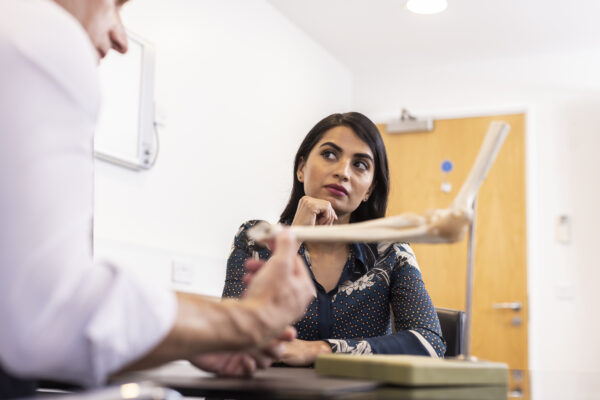Contact number: 020 7806 4060
What is Rotator Cuff Surgery?
Rotator cuff surgery involves repairing damaged or torn tendons in the shoulder. The procedure may be performed using:
- Arthroscopic Surgery: A minimally invasive technique using a small camera and instruments inserted through tiny incisions.
- Open Surgery: For more complex cases, where a larger incision is needed to access and repair the tendons.
This surgery is typically recommended for patients with persistent pain, weakness, or limited shoulder mobility that hasn’t improved with non-surgical treatments such as physiotherapy or injections.
Located in St John’s Wood (NW8), our hospital offers advanced facilities and patient-focused care to ensure a smooth treatment journey.
Rotator Cuff Surgery at St John & St Elizabeth Hospital
At St John & St Elizabeth Hospital, we are committed to delivering high-quality care for patients with shoulder conditions. Our skilled surgeons use advanced techniques to provide effective and personalised treatment.
Why choose us for rotator cuff surgery?
- Specialist Orthopaedic Surgeons: Our consultants are experts in shoulder repair and rehabilitation.
- Minimally Invasive Options: We offer arthroscopic techniques to minimise scarring and reduce recovery time.
- Modern Facilities: Our hospital is equipped with state-of-the-art imaging equipment to deliver precise care.
- Accessible Location: Conveniently based in NW8, we serve patients from Hampstead (NW3), Kilburn (NW6), and the wider London area.
We are dedicated to helping you regain shoulder strength and mobility through compassionate and expert care.
Consultants who perform Rotator Cuff Surgery in London
How Much Does Private Rotator Cuff Surgery Cost?
from £6,275*
The cost of private Rotator Cuff Surgery starts from £6,275* at St John & St Elizabeth Hospital.
*The price shown is an estimated guide to the hospital charges associated with your treatment from admission to discharge. Your final cost may vary depending on your individual clinical needs, the procedure performed, any additional treatments required, the type of implant/prosthesis used (where applicable), and the length of stay. This guide price excludes consultation fees, diagnostic tests, and professional fees charged separately by your surgeon, anaesthetist, and any other specialists involved in your care.
How to pay for your treatment
If you’re… paying for yourself
Did you know you don’t need private medical insurance to come to St John & St Elizabeth Hospital? As a self-pay patient, you can access safe, outstanding quality health care at times to suit you.
For scans and tests, as well as to see most consultants, you’ll still need to be referred by a medical professional like your GP, but as a self-pay patient, the process is more straightforward. You won’t need authorisation from an insurance provider, and you’ll have greater choice of consultant and appointment times.
If you’re… insured
St John & St Elizabeth Hospital is approved by all major medical insurance companies. If you have a personal private health insurance policy, or your company provide it for you, you can use it to pay for your care from your initial consultation through to treatment, surgery and aftercare such as physiotherapy. Not all private health insurance plans cover the same things. It’s very important to check exactly what you are covered for with your insurance provider.
Frequently Asked Questions About Rotator Cuff Surgery
St John & St Elizabeth Hospital is located in St John’s Wood (NW8), a well-connected area of North West London. We are conveniently accessible for patients from Hampstead (NW3), Kilburn (NW6), and beyond.
By Tube:
- St John’s Wood station (Jubilee Line) is just a 5-minute walk from the hospital.
- Finchley Road (NW3) and Kilburn stations (NW6) on the Jubilee Line provide excellent connections.
By Bus:
- Wellington Road: Routes 13, 46, 82, and 113 stop near St John’s Wood Underground Station, just a short walk from the hospital.
- Circus Road: Routes 46 and 187 stop close to the hospital’s Circus Road entrance.
- Abbey Road: Routes 139 and 189 stop near the junction where Grove End Road becomes Abbey Road, providing easy access.
Major Roads:
If you’re travelling from NW3 or NW6, major routes such as Finchley Road or Kilburn High Road offer a direct approach to the hospital.
Our hospital ensures convenient access for patients across London, particularly those in NW8, NW3, and NW6 postcodes.
Rotator cuff surgery usually takes one to two hours, depending on the size and severity of the tear and the type of procedure performed.
Recovery involves a combination of rest, pain management, and physiotherapy. Most patients can resume light activities within six weeks, while full recovery and return to sports or heavy lifting may take four to six months.
After rotator cuff surgery, it’s likely that you’ll have some difficulty with normal activities for a little while. Following rotator cuff repair surgery, physical therapy and rehabilitation are essential for a successful recovery.
You’ll have your arm in a sling for four to six weeks after the operation and a upper limb physiotherapist will work with you to gradually regain shoulder strength and range of motion.
The rehabilitation process can take from six to twelve months, and it’s crucial to follow the therapist’s guidance and any postoperative instructions provided by your surgeon.
The surgery itself is performed under anaesthesia, so you won’t feel pain during the procedure. Some discomfort and stiffness are normal during the healing process, but these can be managed with prescribed medication and physical therapy.
Surgery is recommended for patients with significant tears, persistent pain, or limited mobility that hasn’t improved with non-surgical treatments. Your consultant will assess your condition and recommend the best course of action.
Rotator cuff injuries can cause symptoms such as:
- A dull ache
- Shoulder pain – especially when you lift your arms
- A feeling of weakness when move your arm from the shoulder
- Not being able to move your shoulder completely
- A clicking or grating sound when you move your shoulder
A rotator cuff injury can develop in patients of all ages. In younger patients, this is usually secondary to the application of sports or trauma, while for older patients it’s due to age-related degeneration, wear and tear over time, reduced flexibility, and decreased muscle strength.
It is often seen as a weariness of the shoulder joint, defined by two variations:
- Tendinopathy:
This is the result of the tendons being trapped between the bones at the top of the arm and the ones in the shoulder blade. Sometimes this is also called a subacromial or shoulder impingement. However, in this case, the tendons will tear over time due to the way the tendon, bone, and muscles are coming into contact with each other.
- Rotator cuff tear:
This is when the rotator cuff has been partially torn or fully torn – it can happen suddenly through an injury or gradually over time.
Medically reviewed by Mr Abbas Rashid - BSc(Hons) MBBS FRCS(Tr&Orth) on 02/02/2024


